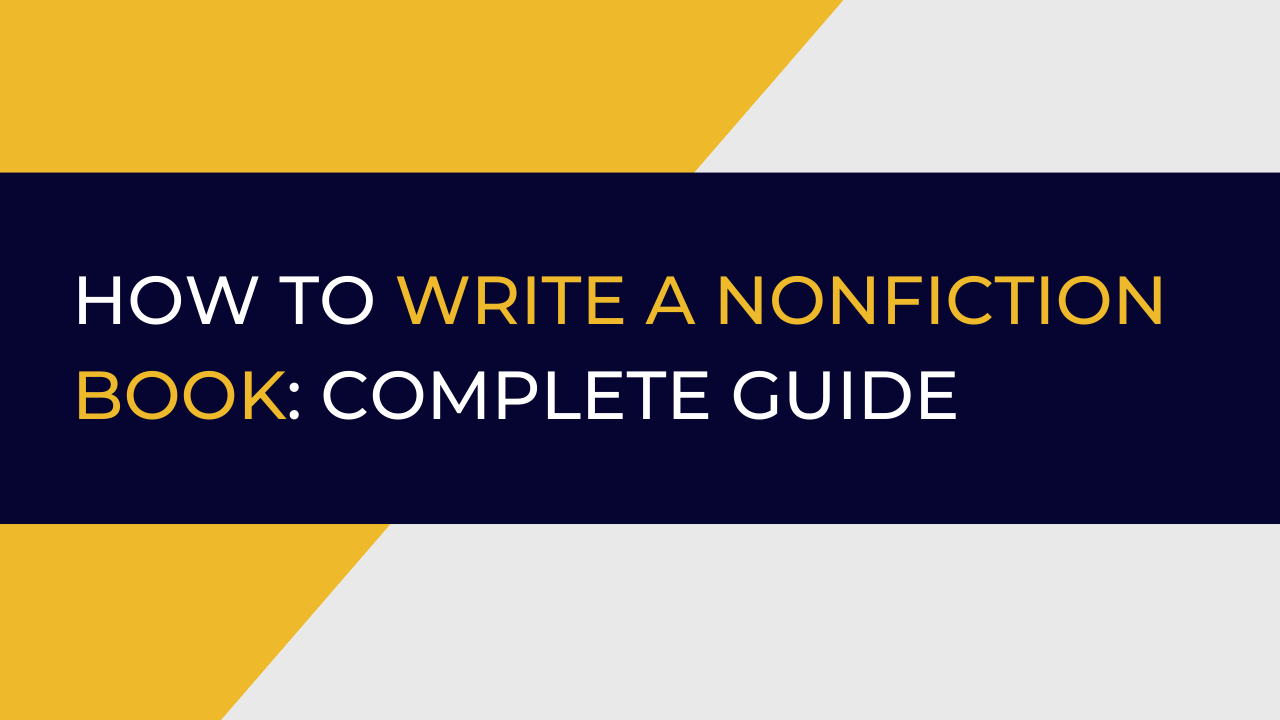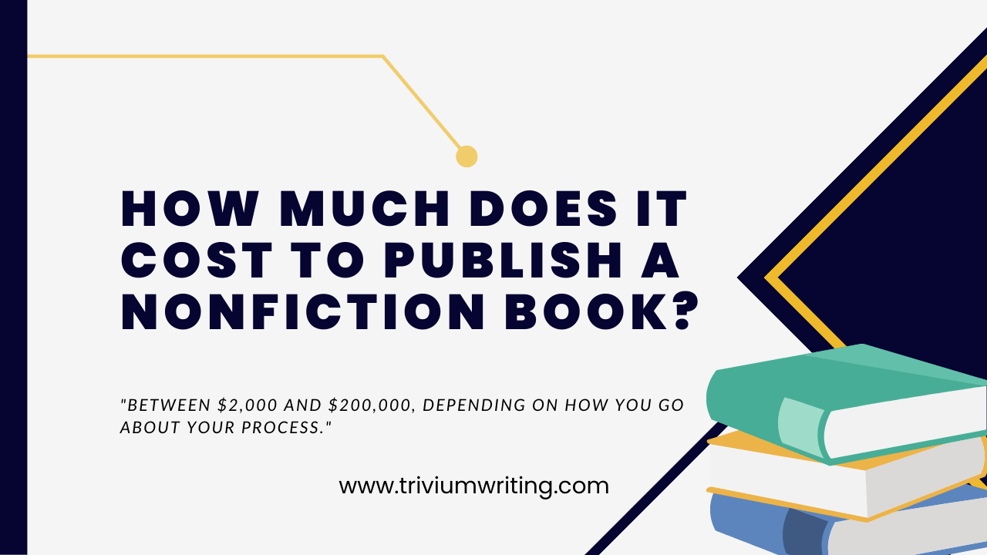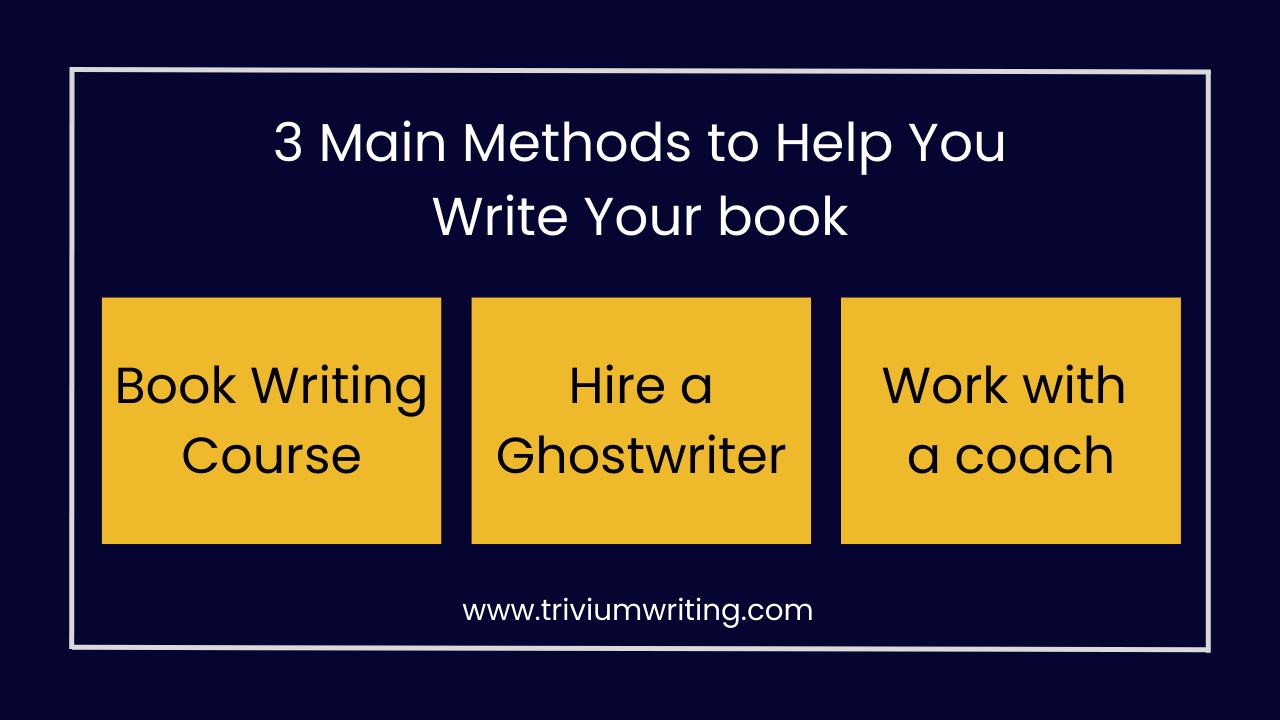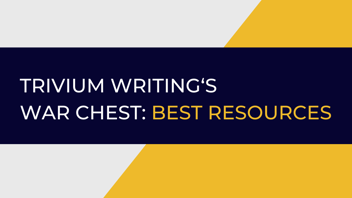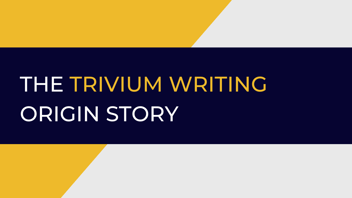How to Write a Nonfiction Book: A Guide for Coaches and Consultants
Most coaches and consultants dream of publishing a book, and for good reason. It's the perfect vehicle to share their expertise on a large scale. It's also a great way to boost their authority, credibility, as well as reach—something, of course, that is always welcome.
Writing a nonfiction book is a wonderful project because it blends three important areas of life: business, influence, and growth. Authors create or grow their existing business through their book, they become more authoritative, and they grow both personally and professionally in the process.
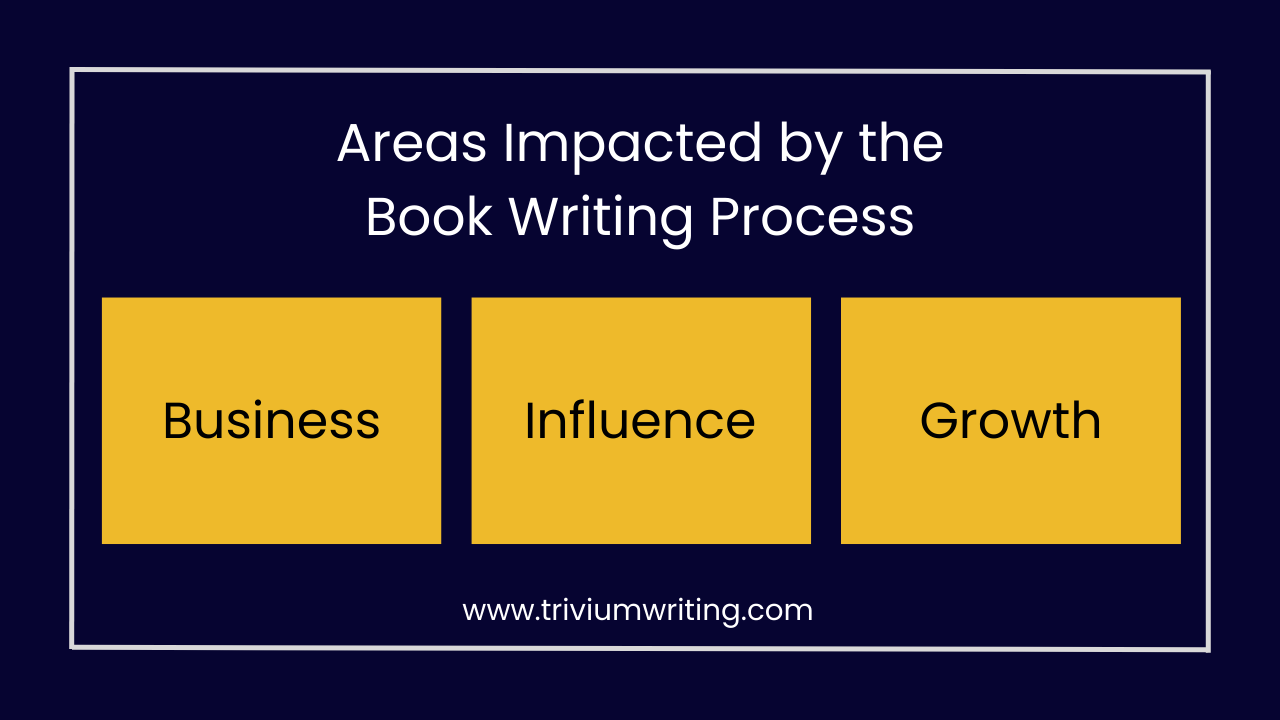
But writing a book can prove a real challenge. There are many steps to writing and publishing a solid piece of work, and these steps bring a lot of questions. More importantly, these steps can also bring deep-seated insecurities. That's why many coaches and consultants never take the leap and do it.
At Trivium Writing, we believe that coaches, consultants, and other service providers benefit the world when they publish their books. That's why I've created this comprehensive guide. In this guide, you'll find the book-writing questions most frequently asked by coaches and consultants, along with in-depth answers for each of them.
My goal here is to give you all the knowledge necessary to make an informed decision about whether to write a book, how to get help along the way, and how to publish it.
Happy reading!
Table of Contents
- Who This Guide is For?
- Why Do I Need this Book? How Should I Read It?
- Why Write a Book as a Coach or Consultant in 2023
- Who Should Publish Nonfiction Books?
- How Do I Know If I Have a Nonfiction Book?
- How Do I Write a Nonfiction Book?
- How Do I Publish a Nonfiction Book?
- What Can I Expect From Publishing a
- Nonfiction Book?
- How Long Should a Nonfiction Book Be?
- How Long Does It Take to Write a Nonfiction Book?
- What Is the Nonfiction Book Writing/Publishing Process?
- How Much Does it Cost to Publish a Book?
Who This Guide is For?
First, let's set clear expectations about who should read this guide.
This guide is for:
- Coaches
- Consultants
- Experts
- Entrepreneurs
- Anyone with knowledge, a story, or expertise they want to share in a nonfiction book.
This guide is not for:
- Fiction writers
- Poets
- Cartoonists
- Children's authors
(I love you guys, but there's a different process for other types of books.)
With that out of the way, let's talk about why this guide is important and how to read it.
Why Do I Need this Guide? How Should I Read It?
TLDR; No promises. Lots of info. Read what’s relevant.
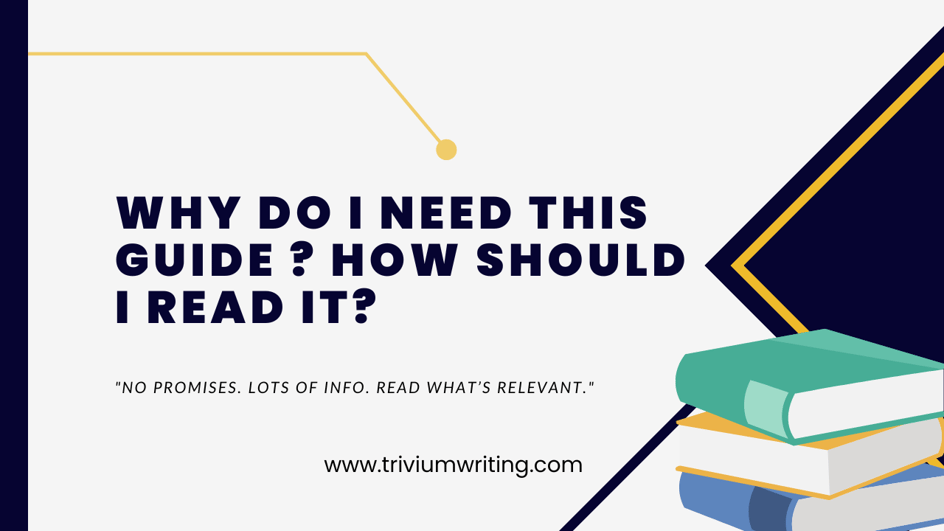
I’m not going to make any promises.
As a coach or consultant, you're bombarded with ads and messages…
- How to increase your revenues...
- How to grow your impact...
- How to gain notoriety...
- Less work...
- More clients...
- More recognition...
You know the tune. Writing and publishing a book is one of these riffs—for obvious reasons. But many of these promises are empty. They’re often ways to exploit coaches’ and consultants’ dreams of freedom, impact, and recognition. How do I know? I’ve been prey to these promises myself. It stings. But this isn’t new.
What’s new is that, in 2023, the market is skeptical and starving. First, the internet leveled the playing field for coaches and consultants. Then, the pandemic flooded the gate with scam artists. And then the recession weeded out those who weren’t cut for business. Right now, the FTC is even investigating the big names in the online coaching industry...
So, if you’re still around today, congratulations!
Surviving 2022 means you can survive any other year. And it means you're in for the long game, which makes you the perfect type of coach or consultant to write a book.
Now, let's take a closer look at the coaching/consulting landscape.
Why Write a Book as a Coach or Consultant in 2023
Today, as I write these lines, the coaching industry is quite interesting.
Hope and desolation are on the horizon.
The market is still keen on buying coaching and consulting services. Plus, competition has decreased because frauds were weeded out. But buyers are more skeptical than ever, and you need to show your legitimacy.
If you’re a true, passionate expert, though, that won’t be a problem. And that might be what brought you to this guide.
Writing a quality book, after all, is the best way to show authority and credibility in the market. It shows your character as a person, your dedication to your field and audience, as well as the depth of your knowledge and experience. It also demonstrates your communication skills, which are important.
As a coach or consultant, writing a book has many obvious and not-so-obvious benefits, including but not limited to:
- increased authority in your market
- increased visibility among your audience
- increased impact all over the world
- increased business opportunities
- passive income
To be clear, I’m not saying a book will make you rich or famous, or that it’ll change your business overnight.
Nor am I saying you should necessarily adopt the method I use with my clients. I run the Author Partnership Program, which helps coaches and consultants write and publish books, but that doesn't mean the program is what you need. Ultimately, this guide's goal is to answer common questions for coaches and consultants without bias.
What I can promise you is that after reading this guide, you’ll know exactly how to write and publish a book. You'll know what it involves, and if it’s for you. You’ll also know which writing and publishing options work best for your unique needs.
This guide answers any question you might have about book writing. It'll also give you the clarity you need to make a decision about writing. Still, you may want some further clarifications after reading this guide, so I've set out some time to speak with you about your book idea.
Who Should Publish Nonfiction Books?
TLDR; Anyone can write a book, but it makes the most sense for entrepreneurs—like coaches and consultants.
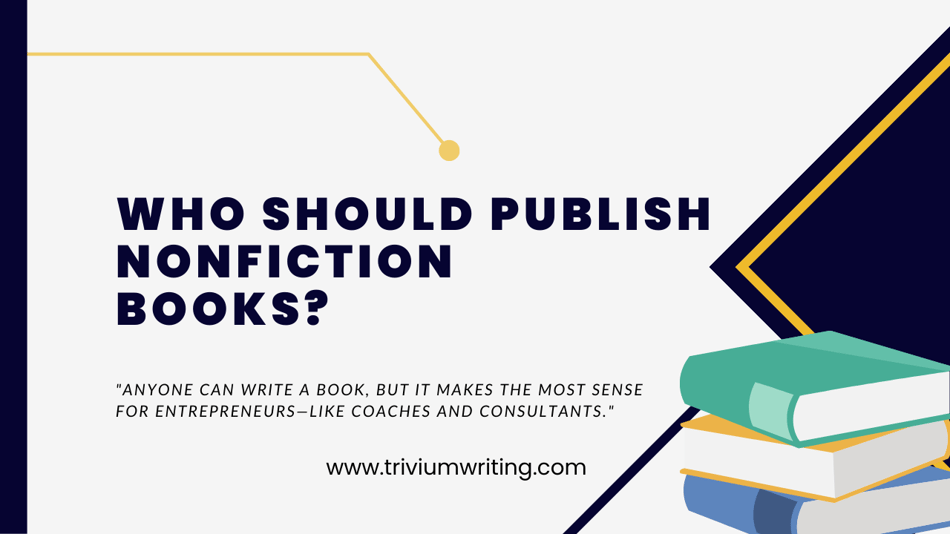
It seems a silly question, but it’s an important one. You may not realize it, but it's the question that keeps most people from ever writing a book. It may be the question that stands in your way, too.
If you're thinking of writing a book, you've thought about it before and yet haven't done it.
It's likely because you’ve wondered, “Who am I to write a book? Who's going to read it?” But, if you’re a coach or a consultant reading this, I hope you know you should write a book.
The fact you’re a coach means you have expertise and experience to share with people. And like every person alive, you have a story and a message to share. You have all the ingredients for a great book!
Anyone can write and publish a book because self-publishing reduces the barriers to publishing a book. But the fact everyone can publish a book doesn’t mean everyone should publish a book. This isn't about worthiness (everyone has something to say). It's about resource allocation.
To write a book, you either pay with time, energy, or currency. And not everyone can make a return on investment. So, you need not only the desire but also the motivation to complete the project.
There are two types of motivation, intrinsic and extrinsic, and they are both necessary.
- Intrinsic motivation, or doing something for the enjoyment of it rather than the result, comes from writing the book itself and will help you stay on track by enjoying the process of writing the book.
- Extrinsic motivation, or doing something as a means to an end, comes from external factors, like growing your brand, business, personal revenue, etc., and will help you justify the resources you allocate to your book.
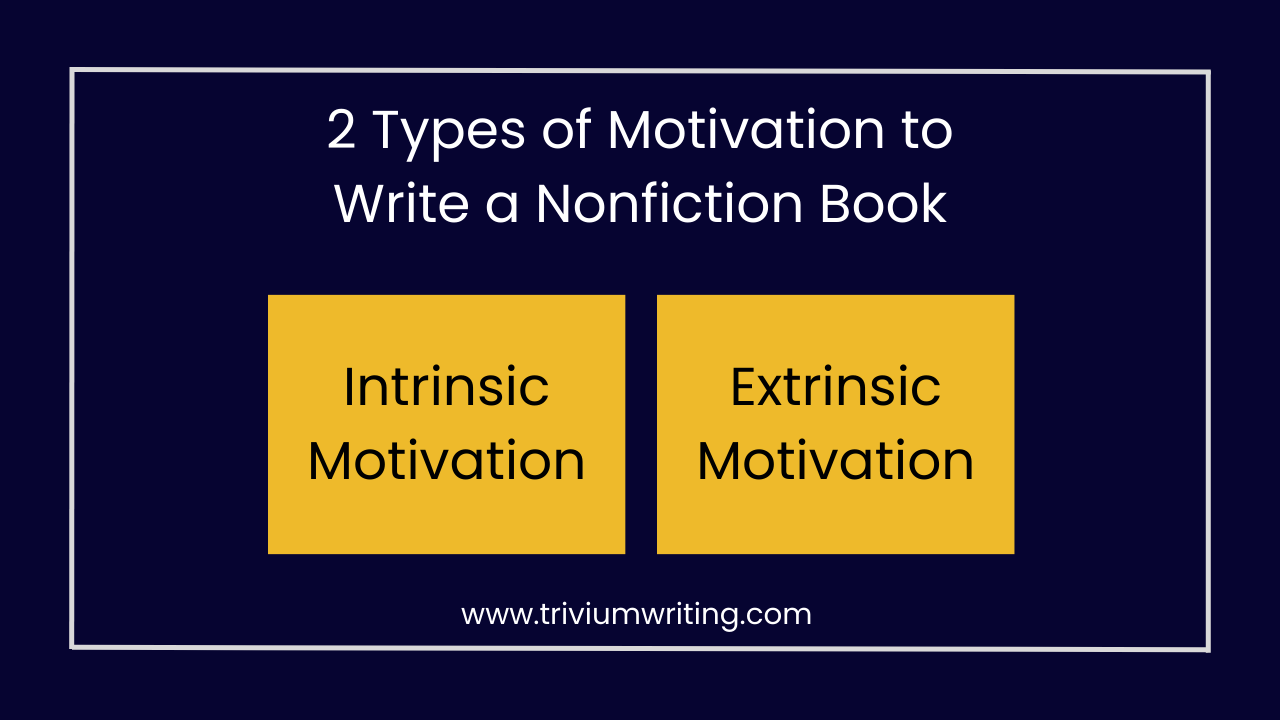
Put differently, entrepreneurs should be writing books. But when I say “entrepreneurs,” I don’t restrict the term to people who already own or run a business only. I include people who want to become entrepreneurs or have the disposition to be one. This includes people with a message, story, or expertise.
A book is a business. Once you give birth to your book, you must manage it one way or another. And while you'll collect automatic revenues from your book sales, to make the best out of it, you’ll need to promote your book and build upon it.
Some people are happy to write a book, put it out there, and move on to the next project. But for most of us, writing a book is only the beginning. You can profit from your book years after publication, but to do so, you’ll need an entrepreneur’s mindset.
The keyword here is mindset. You don't need to be an entrepreneur to write and publish a book. But thinking like an entrepreneur will help you make the best out of the book. This, in turn, will help justify the resource allocation (time and money). When you write a book, you need time or money—or both—depending on the method.
If you sell any product or service, it’s easy to justify writing a book because it can quickly attract enough clients to pay it back. But you may wonder why that matters. Many people want to write a book and have the desire to do so, but they can’t recoup their investment anytime soon. This can be a great obstacle.
How Do I Know If I Have a Nonfiction Book?
TLDR; You know you have a book when you have an idea worth developing substantially.
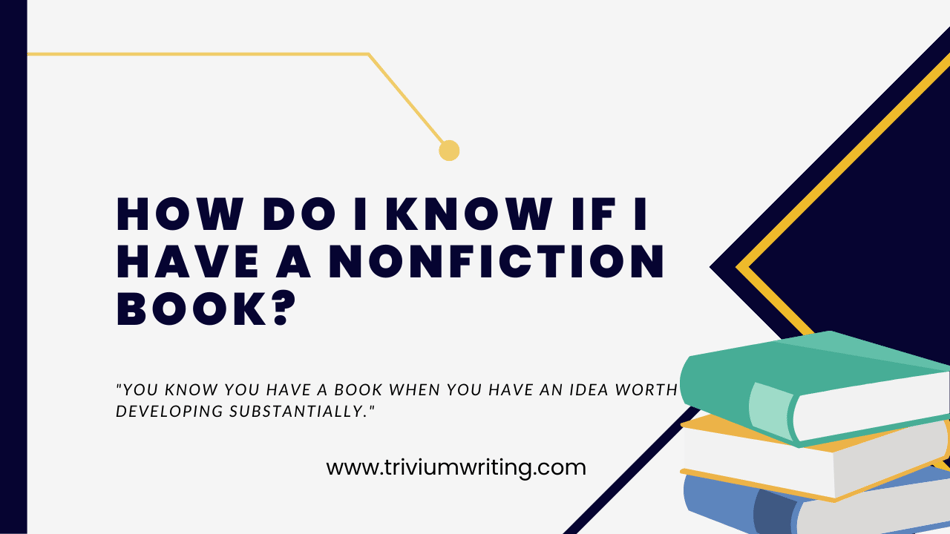
Books aren’t the only way to share your message, story, or expertise. Other mediums are at your disposal, including social media posts, blog posts, magazine articles, and videos.
While none of these mediums afford you the same kind of credibility and impact a book does, they still add value. In fact, they complement books nicely. Now, Given that you can share your message in other ways, how do you know if what you have is enough to write a book?
Technically, anything can be turned into a book. But that doesn’t mean it’ll be a great book. Several characteristics make an idea promising as a book.
The more of these characteristics your idea has, the better your book will be. And the more important it becomes that you write your book.
Signs that your idea deserves a book:
- The idea has a direct or indirect story to it.
- The idea has multiple interconnected elements.
- The idea can be developed into a visual concept.
- There are nuances and complexities to the idea.
- The idea can be developed substantially for readers.
Here’s the important question you must ask yourself: “Do you see this idea being made into a nice physical product.” If you would buy this product yourself, chances are that someone else would too.
Today, a respectable length for a book is 100-150 pages in Microsoft Word 12 pt, 1.5 space lining formatting. Many books are longer, and some books shorter, but a nonfiction book should be approximately 100-150 Microsoft Word pages.
Ask yourself, “Can I write 100 to 150 pages on my topic?”
If you think you can't, ask yourself, “Is there anything that can help me develop my ideas so that I can?” Writing 100 to 150 pages is not as hard as it seems, and it might only require you a little extra research to get there.
And don’t worry about the mechanics and process. There are ways to learn or get help, as outlined in this book.
But if you answered “no” to most of the questions above, you may not be ready to be writing a book. Or it may simply mean you need to talk with someone about it and get help on the project.
How Do I Write a Nonfiction Book?
TLDR; Take a course, hire a ghostwriter, or work with a coach or consultant—all of which require different levels of investment.
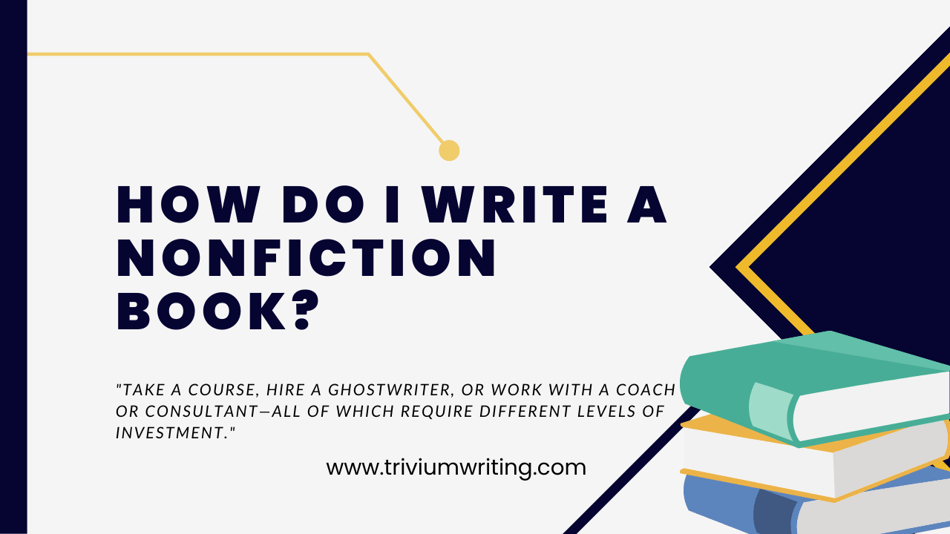
Writing a book is different from writing any other type of content. Unless you have professional writing training, you’ll need some form of guidance on how to write your book.
You can also get hands-on help to write your book—as with the Author Partnership Program.
Three main methods are at your disposal to help you write your book, all of which have benefits and inconveniences:
- Take a book writing course and improve your writing skills. This tends to be the most cost-effective solution, but also the most time-consuming. You can find a lot of great book-writing courses, including Trivium Writing's Architecture of Writing. But a course alone is unlikely to make you a published author in a reasonable timeframe. What you don’t pay with money you pay with time.
- Hire a ghostwriter to write your book for you. This is the most expensive solution, but it’s also the most time-effective. A ghostwriter will interview you and write your book for you. Your time investment is minimal, typically only a few hours a week, and you can expect a financial investment in the tens of thousands of dollars.
- Work with a coach and consultant to write your book. This is the middle-of-the-road solution. Coaches and consultants save you time and effort without breaking the bank as ghostwriters do. While a coach will help you become better at writing, a consultant will make suggestions and polish your ideas and style for you.
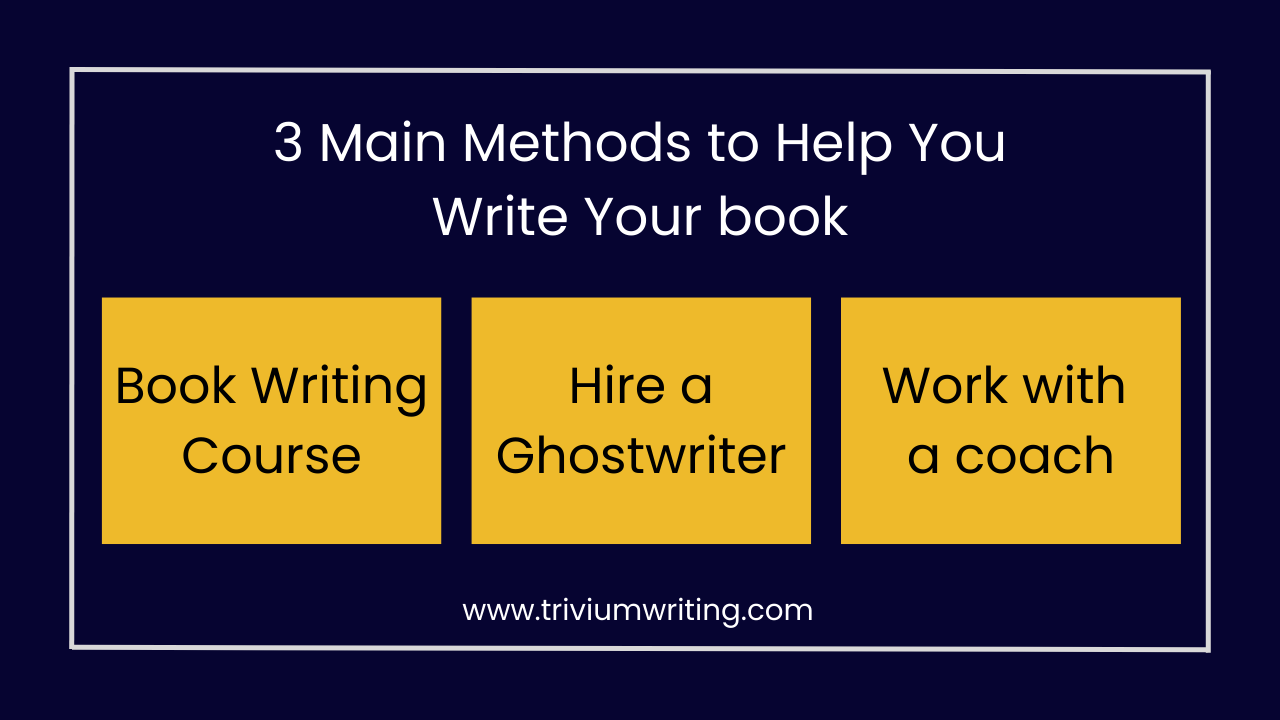
The best method for you depends on how much time and capital you have at your disposal and how you wish to allocate these resources. It also depends on the quality of the book you wish to produce. By doing everything yourself, you’re unlikely to produce a professional-looking book. By working with a coach, consultant, or ghostwriter, you can create an incredible product.
How Do I Publish a Nonfiction Book?
TLDR; Use a traditional publisher, a hybrid publisher, or self-publish. All these options come with pros and cons in terms of cost and creative freedom.
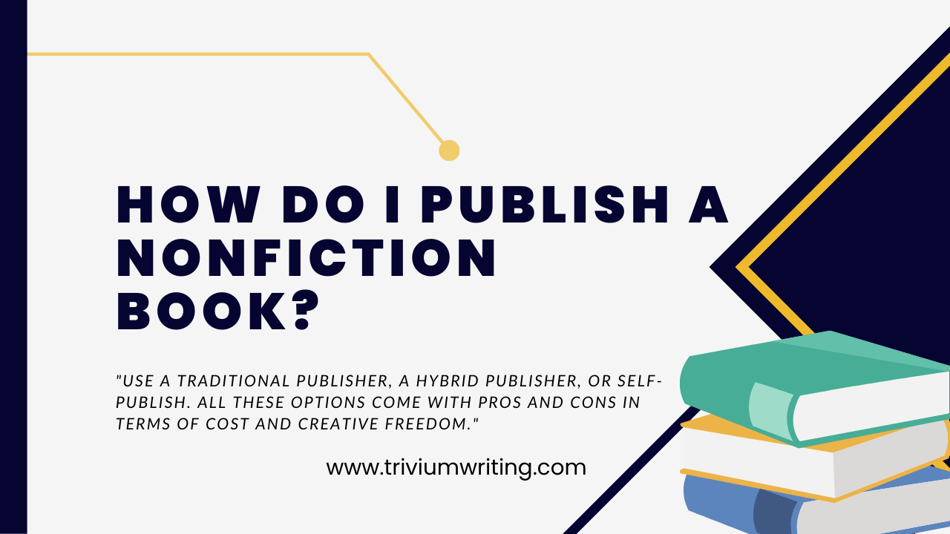
Many publishing methods are available on the market today, and the best one depends on you, your goals, and your resources. While not all publishing methods are equal, they all have merits and can be leveraged to create a successful book.
The three main publishing methods are:
- Traditional publishing: you sign your distribution rights to a publishing company, which takes the financial cost of publishing your book. When you work with a traditional publisher, you don’t have full control over the final product, and the publisher takes a significant portion of the book’s profits.
- Hybrid Publishing: you get the same benefits of working with a traditional publisher but assume your book’s production costs. A hybrid publisher takes care of most of the work typically in exchange for a flat fee.
- Self-publishing: you take ownership of the entire publishing process (though you can easily outsource or work through that process with a consultant). You also assume the cost of production of your book and have more limited distribution.
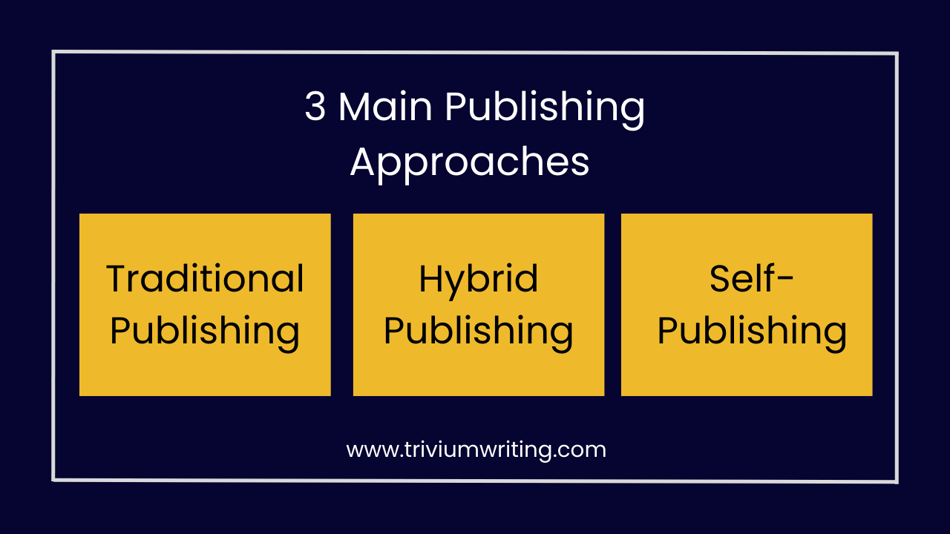
When you consider which type of publishing is right for you, consider the following elements:
- Cost: how much you are going to pay out of pocket to produce your book.
- Freedom: how much say you will have on the final product (word choice, design, etc.)
- Work: how much work you or your personal team/consultant will have to do for you. (You can offset work with cost).
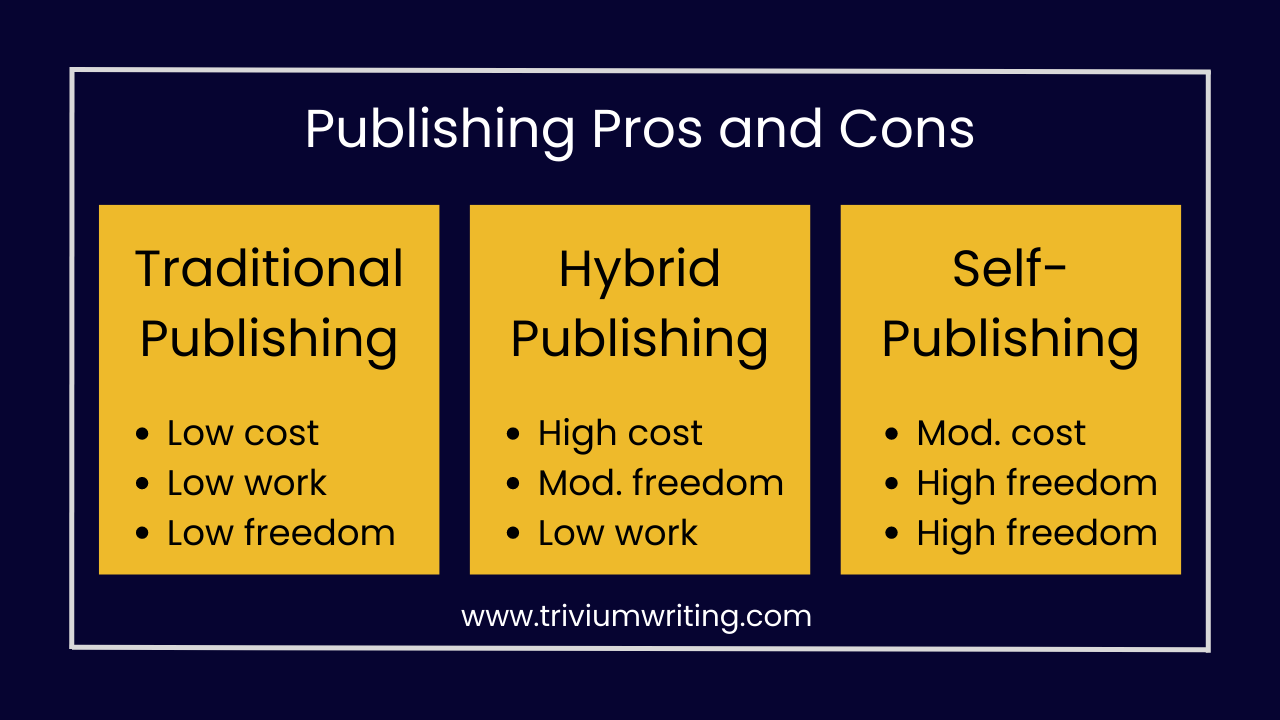
Let’s look at the different options:
- Traditional publishing: low in cost, low in freedom, and low in work (all you need to do is write the book).
- Hybrid publishing: high in cost, moderate in freedom, and low in work (you write the book and let the publisher do the rest, though they will consult with you.)
- Self-publishing: moderate in cost, high in freedom, and high in work (you don’t have to do the work yourself, though; in fact, it’s recommended that you work with professionals.)
Most coaches and consultants use self-publishing or hybrid publishing for two main reasons:
- their business provides the funds to pay for the book’s production, and the investment can be written off at the end of the year
- they need all the liberty and flexibility they need to make their book a great business tool and use it in their business
Examples of Traditional Publishers
Examples of Hybrid Publishers
Examples of Self-Publishing Coaches and Consultants
(Note that Trivium Writing helps authors land book deals and work with hybrid publishers in addition to self-publishing. For a more in-depth analysis of the different publishing approaches, read this article. )
What Can I Expect From Publishing a
Nonfiction Book?
TLDR; It’s harder than you might think, but it’s worth even more than you realize.
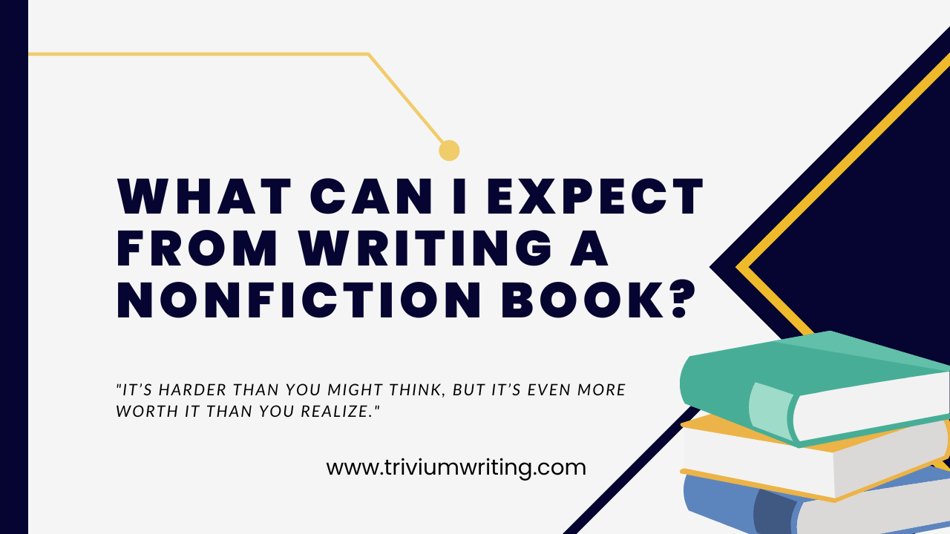
People often come to the book writing/publishing process with the wrong expectations. Some think that writing the book is the end of the process, while some think it should be all about marketing and that publishing a book is an easy money grab.
While every perspective is valid, and what matters is that the author is happy with the results, the most successful and fulfilled authors subscribe to neither of these views. They realize that the truth lies somewhere in the middle.
Here is what to expect from writing and publishing a book:
- Writing a book may prove more difficult than you imagined, even emotionally, but the challenge comes with tremendous growth for which you will be grateful.
- Writing a book will bring you more clarity about who you are, what you do, and why you do it.
- Writing a book simply to say you have written a book is not a good idea. Even the least sophisticated readers can discern the quality of a book. To be effective, a book needs to be high quality.
- Once you've announced you are writing a book, people will ask about it. Be prepared to be held accountable.
- Whichever publishing method you use, you will need to market your book. As much as you are selling a book, you are also selling yourself, so you need to be visible for your book to be visible.
- Publishing a book will put you in the 1% of people to complete this achievement. You’ll gain some bragging rights!
- Publishing a book will change how you see yourself and how other people see you. You will gain authority, confidence, and visibility. People may show you more respect than they did before.
- Publishing a book will bring you new opportunities—including speaking at conferences and panels, sitting on boards, and presiding associations—that may not have been available to you before.
- Publishing a book will increase your authority in the marketplace and allow you to charge higher prices and close deals more easily.
- Publishing a book will bring people to you with questions, comments, testimonials, and the like. Expect to be asked and told about your book by the public.
- Publishing a book will increase your audience. People who discover and enjoy your books will likely follow you on social media and sign up for your newsletter if you have one.
- Publishing a book might make you want to publish more books. The feeling of achievement that comes from publishing a book is addictive. This is the case with Trivium Writing’s clients.
- Publishing a book will make you bolder and more confident in your life, which may prompt you to take greater leaps and do the things that used to make you feel uncomfortable.
How Long Should a Nonfiction Book Be?
TLDR; Between 5,000 and 80,000 words, depending on whether you write a lead magnet, a client primer, or a leadership/philosophy book.
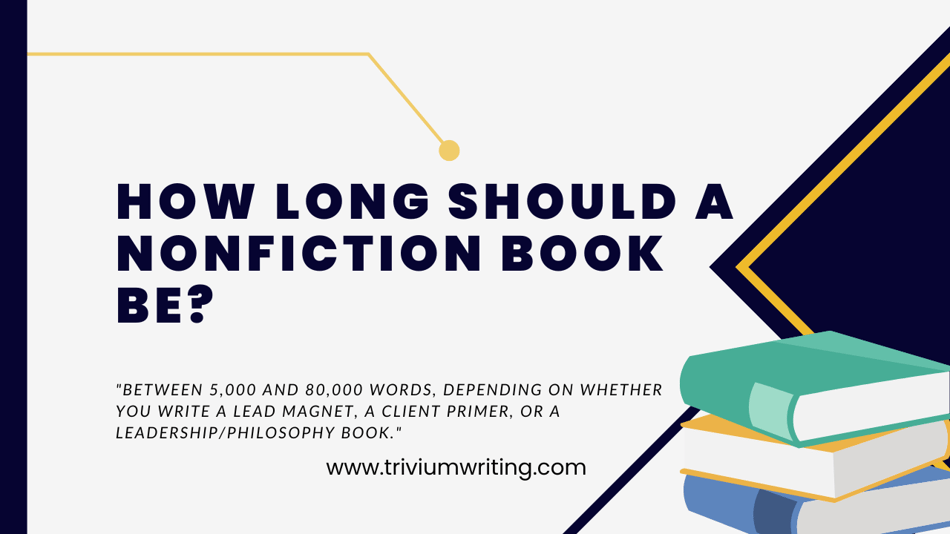
It’s no secret that the length of your book will depend on the subject matter, your intended audience, and what you want to achieve in terms of content and message. But there is a simple framework to determine how long your book should be.
To begin with, a book’s length does not matter as much as we typically imagine. True, most professionally published books share a similar length. But that’s because traditional publishing has a certain standard for how much substance should go into a book.
That said, not all traditionally published books are good books, let alone life-changing. Some of the world’s best books are very short and self-published.
In today’s publishing landscape for coaches and consultants, there are three types of books coaches and consultants can write
- Lead Magnet: between 5,000 and 10,000 words. It serves authors who run a business or practice and want to generate leads with the book. A lead magnet typically gives away the “what” and the “why” without divulging the “how.”
- Client Primer: between 10,000 and 30,000 words. More substantial than the lead magnet, it’s geared toward preparing readers to become your clients. In addition to providing the “what” and the “why,” client primers also offer parts of the “how.”
- Leadership/Philosophy Book: between 30,000 and 60,000 words (often as long as 80,000 words). They widely differ from lead magnets and client primers because they use an indirect approach to building authority and credibility. Instead of aiming at teasing readers or letting them have a taste, leadership/philosophy books aim to distill the author’s knowledge into its fundamental parts.
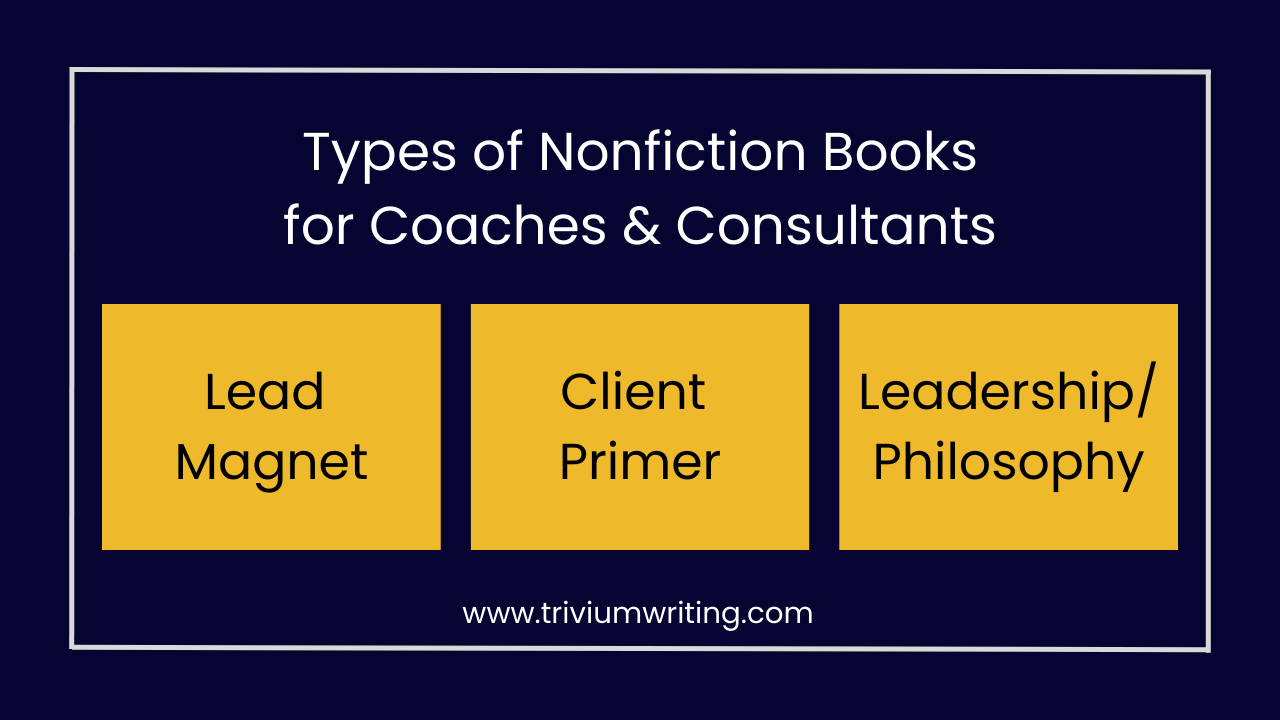
While lead magnets and client primers are great tools, leadership/philosophy books are the best way to build true, lasting authority because not anyone takes the time to write such books.
How Long Does It Take to Write a Nonfiction Book?
TLDR; Between 4 months to a year, depending on how long your book is and how much time you spend writing weekly.
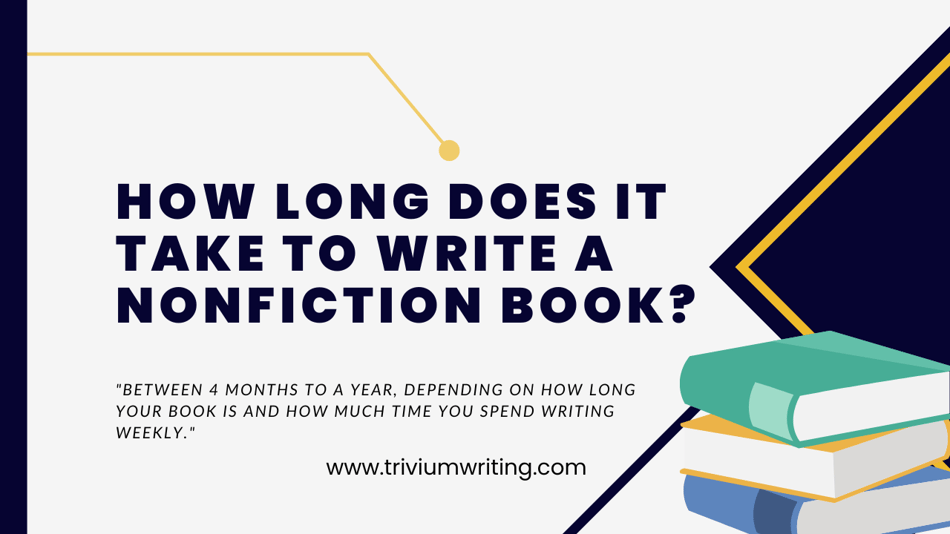
Writing a book is like running a business. If you run a business, you must know your product or service’s economics. The same is true of writing. You must know your word count economics. The trickiest part of figuring out how long writing a book takes is being able to predict how many words you can write in each period. But we’ll solve that in a moment.
The first thing you need is to figure out how long your book should be. If you’re writing a lead magnet, you’ll write from 5,000 to 10,000 words. If you write a client primer, you’ll write from 10,000 to 30,000 words. And if you write a leadership and philosophy book, you’ll write from 30,000 to 60,000 words.
Our clients at Trivium Writing use our unique method—a hybrid between writing coaching and ghostwriting—which allows them to write around 900 words an hour. Let’s break down the word count economics based on our method and recommendations:
- 900 words/day
- 7,500 words/week
- 30,000 words/month
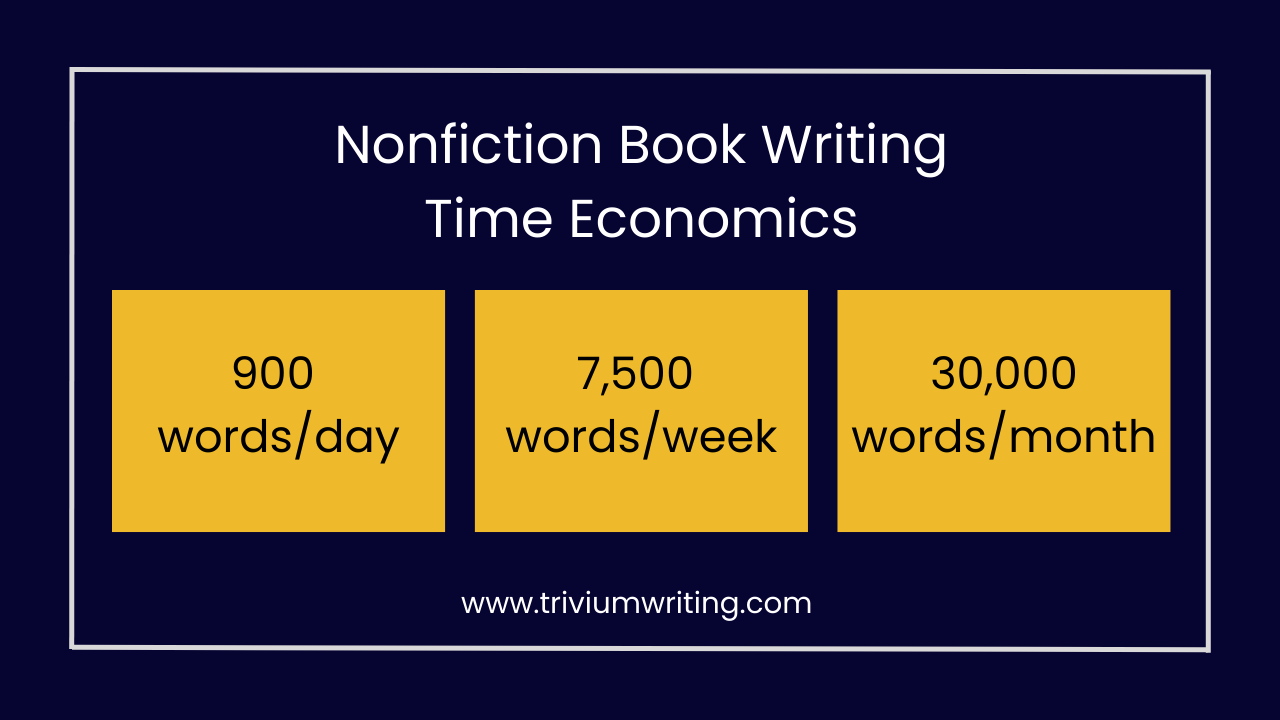
Based on these economics, you could write a lead magnet in a week, a client primer in a month, and a leadership/philosophy book in 2 to 3 months.
What Is the Nonfiction Book Writing/Publishing Process?
TLDR; From planning to launching, there are 10 steps to the writing and publishing process.
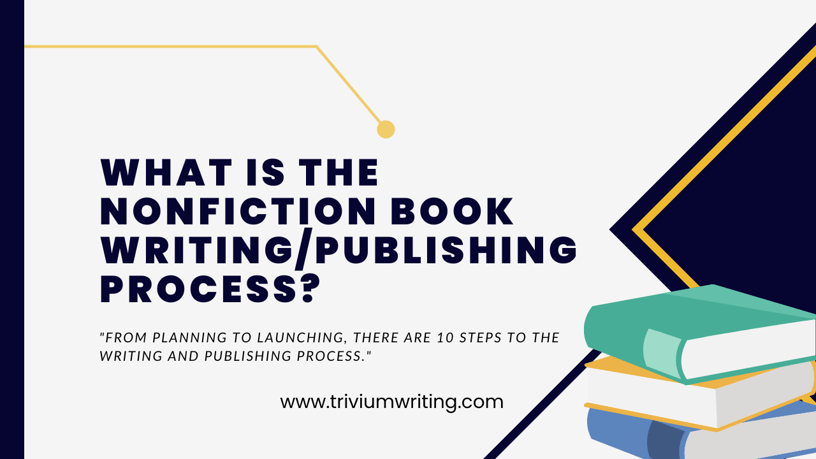
The book writing/publishing process isn't complicated, but it does comprise a number of different steps that need to be taken in order to make a book successful.
The process comprises four broad categories:
- Planning
- Writing
- Publishing
- Marketing
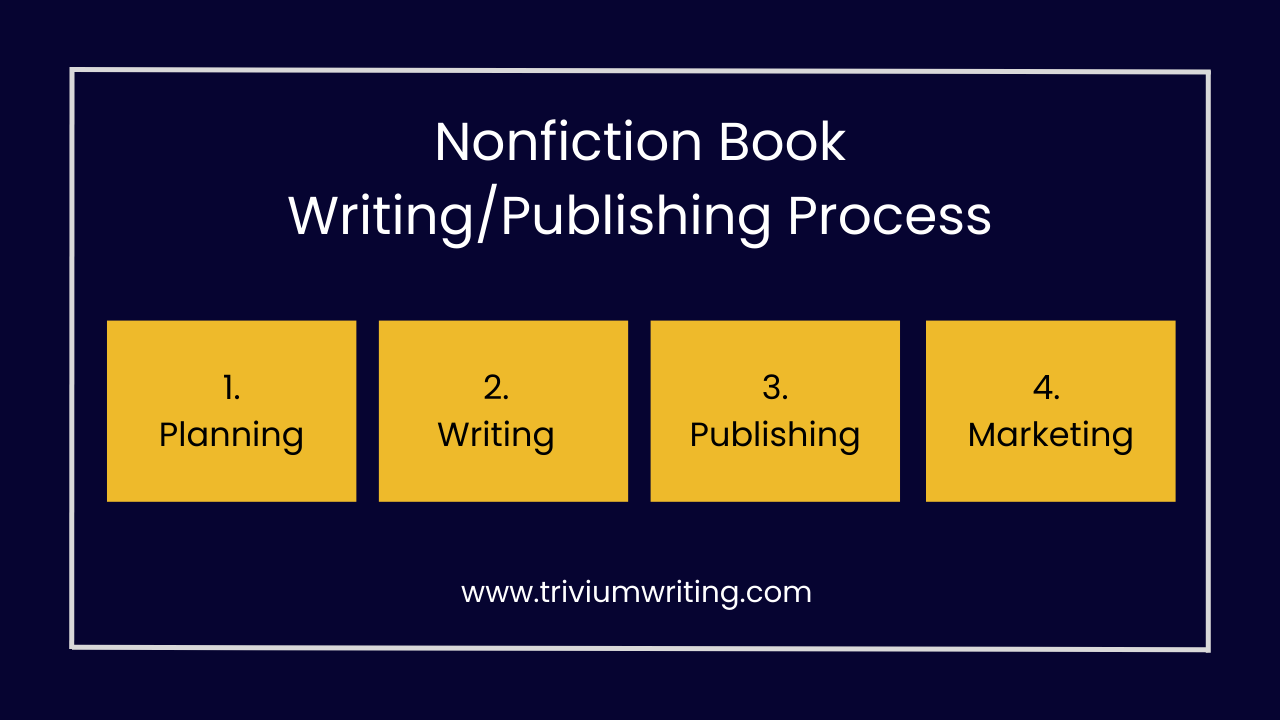
Here are the ten steps to writing and publishing a book, according to the Trivium Writing process.
Note that this process can differ based on client needs. Moreover, the steps outlined in this process assume that the client follows the self-publishing route. Clients taking the traditional publishing route follow a different process. For more information, book a free consultation.
Step 1: Planning
- Goal Setting: set your goals for your book and create clarity around what you want out of the book.
- Strategies: decide which strategies you'll use to promote your book and profit from it.
- Launch Date: decide the date you want to publish and launch your book for accountability.
Step 2: Foundations
- Philosophical Architecture (your audience): gain clarity around the worldview of the audience you are writing for.
- Internal Architecture (your message): craft your message using the Architecture of Writing method.
- External Architecture (style and tone): with the Architecture of Writing still, decide how to structure your book and with which style to write it.
Step 3: Pre-Marketing
- Title and Subtitle: decide on a tentative book title and subtitle so you can start talking about your book.
- Book Blurb: write a preliminary book blurb to show potential readers who would like to learn more about your book.
- Chapter Outline: write a brief chapter outline that covers the entirety of your book to show the book's contents.
Step 4: Design & Sales
- Book Cover: hire a professional book designer to design your book cover and start marketing your book.
- Introduction: write the introduction to your book to give potential readers an idea of your content and style.
- Landing Page + Email List: build a landing page to showcase your book and let people opt into your email list.
Step 5: Marketing
- Dream 100 + Beta Readers: find 100 people with whom you resonate who could promote your book and start building a relationship with them. Find four to five people close to you who can read your book and give unbiased feedback.
- Media Kit: build a media kit that includes a bio, pictures, and links to connect with you so you can promote yourself as a speaker and podcast interviewee.
- Start Advertising: start talking about your book on social media and at events to generate interest in your work.
Step 6: Writing Process
- Writing: write the first draft of your book, which does not need to be a masterpiece.
- Feedback: ask your beta readers to read your first draft and provide feedback on the content and style.
- Revision: revise your work based on feedback, polish your content, and improve your writing style.
Step 7: Post-Writing Process
- Copy Editing: hire a professional copy editor to improve the quality and accuracy of your writing.
- Proofreading: hire a professional proofreader to identify and correct any remaining mistakes and typos.
- Layout: hire a professional book designer to create your book's layout and put together your files.
Phase 8: Pre-Publishing
- Upload to KDP: upload your book cover and book interior files to Amazon KDP.
- Optimize Book: write your book description, select your book categories, and set your publishing parameters.
- Create Amazon Ad: use the Amazon Ads platform to create an ad that will promote your book on Amazon's bookstore.
Phase 9: Publishing
- Order Proof Copies: order proof copies of your book to make sure the final product is flawless.
- Launch Book to List: publish your book and announce it to your email list asking for reviews.
- Get Early Reviews: wait for your first readers to buy and review your book.
Step 10: Book Launch
- Book Launch: launch your book to the world by announcing the release everywhere you can.
- Podcast Tour: pitch
- More Advertisement:
How Much Does it Cost to Publish a Book?
TLDR; Between $2,000 and $200,000, depending on how you go about your process.
If you’re going to self-publish and cover the cost, you have to factor in 3 different types of costs:
- Getting help writing the book
- Publishing the book
- Marketing the book
In theory, you could do everything yourself and pay nothing. But as a coach or consultant, you can’t afford to publish a botched book. It will reflect poorly on your brand and turn off readers as well as potential clients.
Getting Help Writing Your Book
Getting help writing your book could be taking a course, hiring a ghostwriter, or working with a coach or consultant. Here are some typical price ranges for each option:
- Book writing courses: between $100 and $2,000 (some are free)
- Coaches and consultants: between $2,000 and $20,000
- Ghostwriters: between $20,000 and $200,000 depending on who you hire and the type of book you work on
Publishing the Book
Publishing your book involves four main expenses to cover:
- Editing: typically between US$0.05 and US$0.49/word ($2,000 for a 40,000-word book)
- Proofreading: typically between US$0.03 and US$0.5/word
- Formatting: $250 to $1,000 ($1,200 for a 40,000-word book)
- Cover design: $500 to $2,000+ (depending on design type)
Marketing the Book
Marketing your book is up to you and depends on your budget.
Expenses can include, but at not limited to:
- Paid traffic: typically a minimum of US$150/month on a platform such as Facebook, Google, Amazon, or LinkedIn
- Paid shutouts: typically a minimum of US$100 per shutout on relevant Instagram pages (based on audience and engagement)
- Paid outreach: typically a minimum of $100-300/month to have an assistant reach out to podcasts and other publications to get you publicity
Conclusion
Writing and publishing a nonfiction book is no small feat. But as a coach or a consultant, it's worth all the time, money, and effort you'll put into it. A book is the best tool to get more business, gain influence, and accelerate your personal growth. In this guide, I've answered the questions coaches and consultants ask the most to help you start. Now it's time to go use this information!
Trivium Writing has helped produce 20 books and counting. We know the writing and publishing process inside and out and offer custom services to help you write your book. For example, our Author Partnership Program is a coaching program specifically tailored to coaches and consultants. We also offer consulting, ghostwriting, and editing services, which you can learn more about over a free 30-minute consultation.
Best wishes on your writing and publishing journey!
Article by Leandre Larouche
Leandre Larouche is a writer, coach, and the founder of Trivium Writing.

